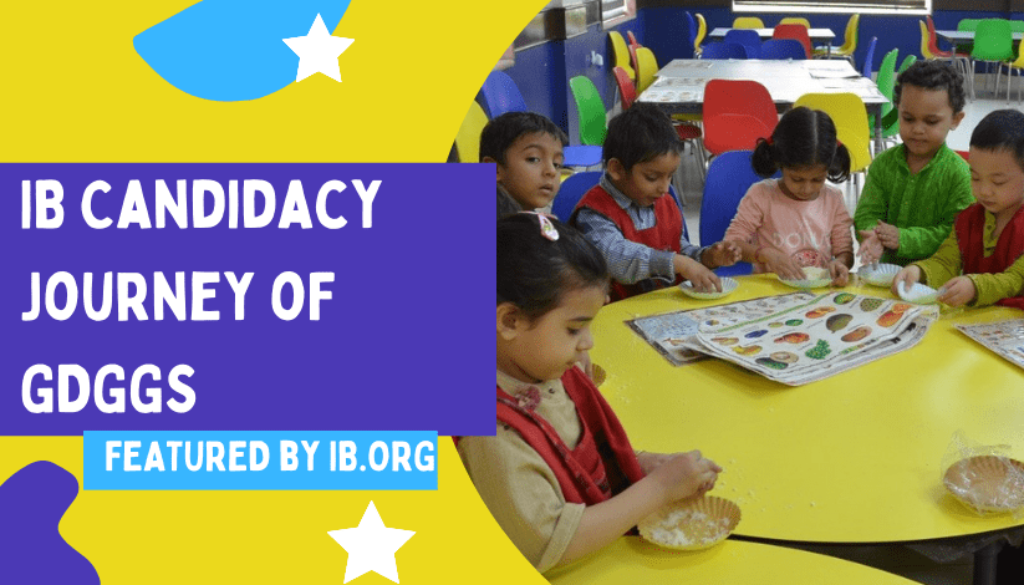How one Gurgaon school overturned attitudes and changed perceptions: the candidacy journey of a PYP school
Miss Navina Chadha, Principal, GD Goenka Global School, Gurgaon
The need for education to change with the times is more important now than it has ever been. However, when the time comes for parents to decide on a school and curriculum for their own children, there is often a resistance to choosing a truly unique and innovative programme, frequently due to an unfamiliarity compared to the traditional education that parents themselves received as children. Yet, in order to succeed in the workplace and in life beyond the classroom, the needs and requirements of today’s learners are very different to the needs of generations that have gone before them. The International Baccalaureate (IB) Primary Years Programme (PYP), designed for children aged 3 — 12, offers a flexible and tailored programme that empowers students to take ownership of their own learning, while equipping them with the skills to succeed and flourish as they progress into their further studies.
Traditional education systems rely on a process of rote learning, where information is taught to be memorized and recited as a measure of inherent understanding. The PYP, on the other hand, provides a flexible, inquiry-led framework, which enables schools to build and adapt a unique curriculum that is relevant both to the local context of the school and the interests of its students.
GD Goenka Global School (GDGGS), founded in 2018 and based in Gurugram, DLF 3, Northern India, is an IB Candidate School that is in the process of implementing the PYP for children from Pre-Nursery up until, and including, Grade 5. During this candidacy phase, we have been working with the IB to ensure that we are aligning our teaching practice and school philosophy with the IB’s values in order to be authorized as an IB World School. Our mission is to create a learning environment that allows children to unlock their potential in a safe, respectful and enjoyable setting which is conducive to learning.
When we first decided to embark on the IB candidacy journey, reactions were mixed from our parent community. Some of our parents who were familiar with the IB were excited by the opportunity and those who were unfamiliar were more apprehensive as to what the changes would mean for their children’s learning experience. So, what we were working towards was bringing everyone to a shared perspective, rather than starting from scratch. We made efforts to share information with our parent community about the IB’s presence across the country and we invited them to learn more about the IB’s recognition by local and international schools and universities. We were also able to draw on stories from local alumni who advocated for the IB’s programmes, which was really helpful.
A core part of getting our community onside was communicating to parents that they are equal partners with us in their child’s learning journey. As a school we strive for complete transparency with our parents; we distribute a lot of newsletters, photographic evidence of their children’s work and we regularly invite our parents to engage in various activities in a classroom that explore and celebrate the importance of international-mindedness so that there are many opportunities for inclusion and collaboration.
Through this engagement process, the initial resistance from some parents to the PYP has now transformed into appreciation and endorsement. One of the crucial influencing factors is also the change parents see within their own children, which has had a significant impact on their perception of the programme. In particular, for parents who went through the traditional rote learning system themselves, now see a significant difference in their children’s enthusiasm and agency in their learning when compared to their own experiences.
There was also a preliminary misconception that the IB programme was more targeted towards children who planned on studying abroad after graduating and, as such, the curriculum was not as relevant for the local people. In response, we were swift to demonstrate to our parents how the IB philosophy maps to the national curriculum, as well as introducing them to the IB learner profile and the approaches to learning (ATLs) skills. By being able to demonstrate how the PYP framework simultaneously honours the state curriculum, creates space for content to be moulded to the interests of the students to encourage and is able to reflect current affairs around the globe, we have been able to address these misconceptions. The PYP takes into account everything that is being done in the national system, but goes beyond it with the innovative teaching methodology.
The most important thing that we have seen throughout our candidacy journey is true value of prioritizing student agency, this is a key point of difference which makes the IB stand out. By focusing on developing agency, students grow more confident, improve their decision making and develop critical thinking skills, which in the current global state of change we are all experiencing, will be vital skills in their future.
For more information about our admissions process: Admissions





